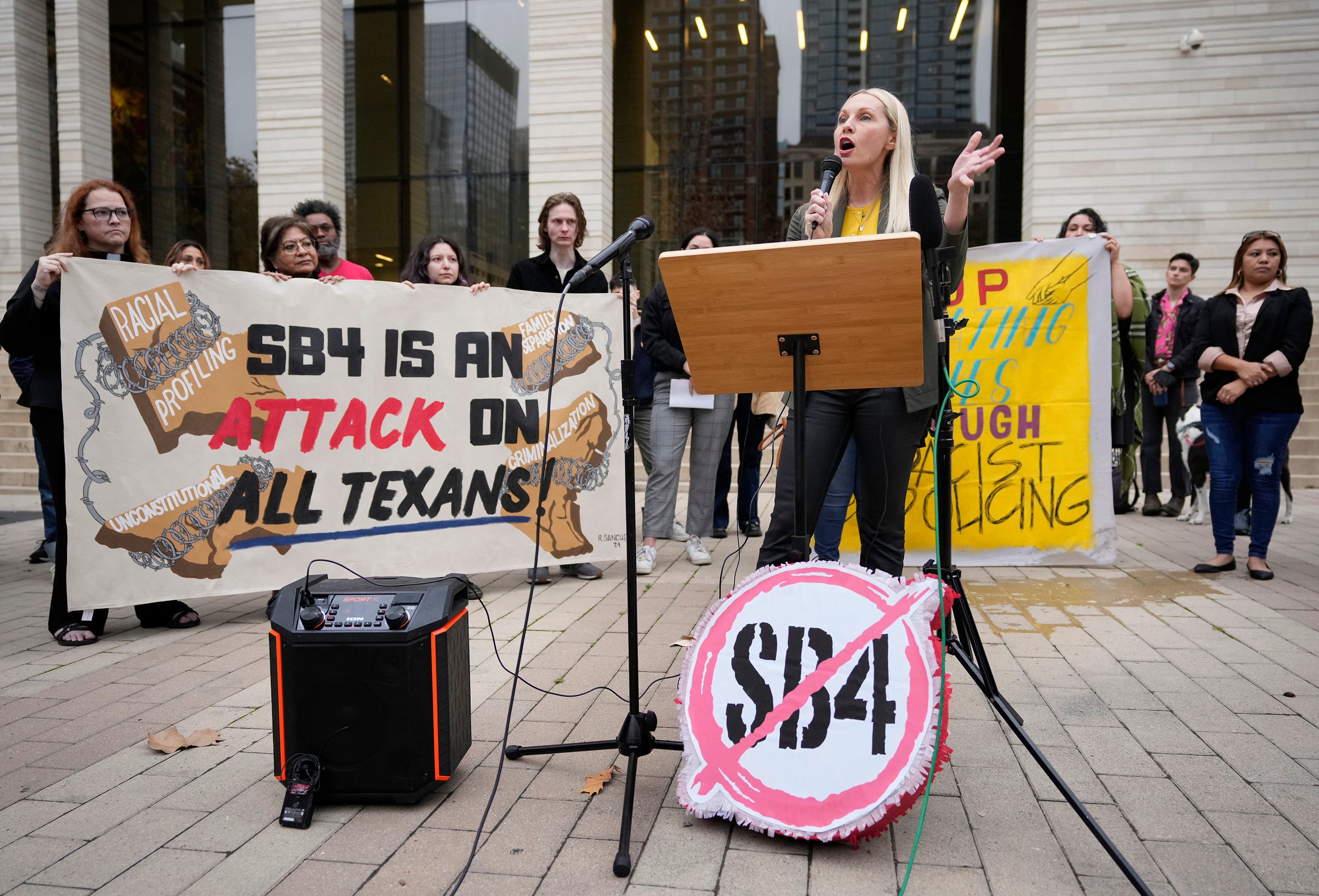Federal judge blocks anti-migrant Texas law and shoots down GOP ‘invasion’ claims
Judge pauses state law based on Republican-led arguments that have been ‘unequivocally rejected by federal courts since the Civil War’


A federal judge in Texas has temporarily blocked a state law that would allow local law enforcement to arrest, detain and kick out migrants if they’re suspected of being in the US without legal permission, going above federal authorities to enforce what civil rights groups have condemned as one of the most “extreme anti-immigrant” laws in the country.
The court’s decision on Thursday will block the law from going into effect while litigation continues from a pair of lawsuits from the US Department of Justice and a coalition of immigrant advocates.
US District Judge David Alan Ezra said the state was likely violating the constitution and US immigration laws, but he also shot down the states’ contention – and arguments from Republican officials – that an increase in immigration from the US-Mexico border constitutes an “invasion”.
“To allow Texas to permanently supersede federal directives on the basis of an invasion would amount to nullification of federal law and authority – a notion that is antithetical to the Constitution and has been unequivocally rejected by federal courts since the Civil War,” he added.
Texas’s Senate Bill 4, derided as a “show me your papers” law set to take effect on 5 March, would allow state and local law enforcement to police immigration, superseding federal authority, as immigration on the US-Mexico border and the government’s ability to process people seeking asylum become a volatile flashpoint for 2024 elections.
A lawsuit from civil rights groups and the Justice Department against Republican Governor Greg Abbott and the state’s Department of Public Safety argued that the law is preempted by the US Constitution, and unlawfully puts immigration law into the hands of Texas judges to determine whether someone should be deported – regardless of their eligibility for asylum or other humanitarian protections under federal law and international accords.
“With today’s decision, the court sent a clear message to Texas: SB4 is unconstitutional and criminalizing Black, Brown, Indigenous, and immigrant communities will not be tolerated,” according to a statement from Jennifer Babaie, director of advocacy and legal services with Las Americas Immigrant Advocacy Center, among the chief plaintiffs in the case.

“This crucial decision allows us to continue to focus our efforts on building a safe, legal, humane immigration system not contingent on abuses like racial profiling and harassment,” she added. “We must continue to be vigilant against Texas’ politics of fear and hatred. But today, immigrants and Texans of color get to pursue living lives of hope, opportunity, and family. It’s a win worth celebrating.”
The lawsuit was filed in December 2023 by the American Civil Liberties Union, the ACLU of Texas, the ACLU, and the Texas Civil Rights Project on behalf of El Paso County, American Gateways, and Las Americas Immigrant Advocacy Center.
The case was consolidated with a parallel suit from the Justice Department.
Aron Thorn, senior attorney with the Beyond Borders Program at Texas Civil Rights Project, called the decision a “major step in showing the state of Texas and Governor Abbott that they do not have the power to enforce unconstitutional, state-run immigration policies.”
“While this is only the first step in abolishing the law, people across the state can breathe a sigh of relief knowing they will not be needlessly arrested or deported by Texas under SB4,” he said.
In his order on Thursday, Judge Ezra warned that allowing SB4 to take effect would open the door for other states to pass their own immigration laws, upending federal law, and threatening the “fundamental notion that the United States must regulate immigration with one voice.”
The plaintiffs and the immigrants they represent would “suffer grave irreparable harm” if the law was allowed to stand,” the judge said.
His decision arrived hours before parallel trips to the southern border from President Joe Biden and Donald Trump, with the former president offering his draconian vision for an immigration policy that would see mass deportations, while President Biden has accused Republicans in Congress of repeatedly failing to pass bipartisan immigration reform.
Join our commenting forum
Join thought-provoking conversations, follow other Independent readers and see their replies
Comments
Bookmark popover
Removed from bookmarks